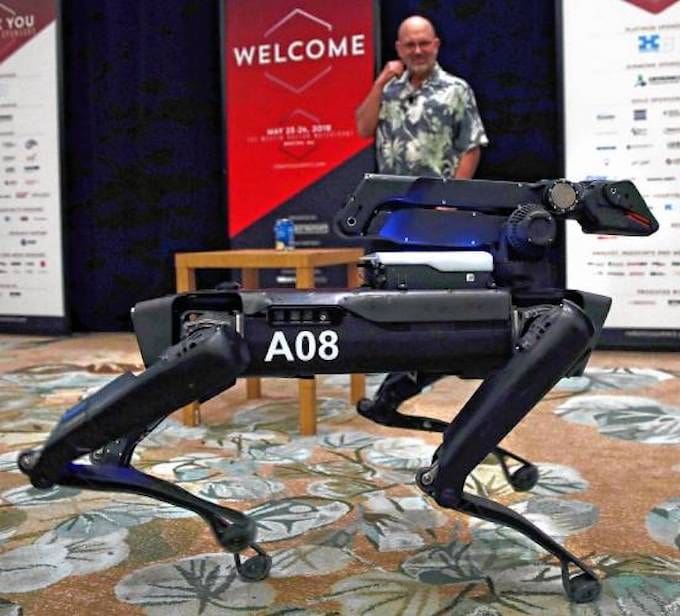The robots are coming, and they’re bearing pizzas – or soon will be. In a pilot program that could begin this summer, FedEx has teamed up with Dean Kamen and his cutting-edge engineering company DEKA to create a six-wheeled delivery robot. The experiment, if successful, raises interesting questions for society and policy makers, the first of which is, “Do you tip the robot that delivers your pizza?”
FedEx’s SameDay robot is a variation of DEKA’s iBot Personal Mobility Device, a wheelchair that can climb curbs and stairs. Cameras, global positioning and sensors allow the robot to navigate and avoid obstacles and pedestrians. Artificial intelligence allows the battery-powered machine to remember routes and learn as it goes. The bot can move up to 10 mph and carry up to 100 pounds. When it arrives at its destination, customers open the robot’s door to retrieve their purchase with a code sent to their cell phone. Among the companies reportedly talking to FedEx about its new service are Pizza Hut, Lowe’s, Target, AutoZone, Walgreens and Walmart.
The next question is, what happens to the countless people who make their living delivering things who could be replaced by robots? Most schools offer robotics courses and field robotics teams for a reason. It’s the future, a future that could idle the millions of people who make their living moving things or people from one place to another.
More jobs have been lost to automation, especially in factories and manufacturing industries, then to outsourcing or immigration. Bank tellers, cashiers and even cooks are being replaced with machines. McDonald’s has been replacing the counter help that takes customer orders with touchscreens. A West Coast fast food company has a robot that can cook and assemble 360 hamburgers per hour.
Boston Dynamics recently posted a video that shows a team of the company’s SpotMini robotic dogs towing one of its company’s delivery trucks. Click on the link if you dare.
Creepy? You bet. Most humans find interactions with robots unsettling – a bit like a cat’s first contact with a Roomba, the scurrying little robot vacuum cleaner that debuted in 2002. The robotic dogs, which at 66 pounds weigh about as much as a hefty retriever, may not be as affectionate, but since they come equipped with a hand-like device in addition to four legs, they probably could be taught to scoop poop.
The robot advance, and the job displacement it will create, seems inevitable. Some of the nation’s wealthiest and tech savvy individuals, people like Bill Gates and Elon Musk, say technology could automate so many jobs that a universal basic income, essentially a check from the government, may be necessary to support people who can’t find work.
Last year, three economists writing in the Oxford Review of Economic Policy concluded that the job losses and flat wages caused by automation in manufacturing states influenced the outcome of the 2016 presidential election.
“We document that support for Donald Trump was significantly higher in local labor markets more exposed to the adoption of robots,” the economists said. “
… Our estimates show that Michigan, Pennsylvania and Wisconsin would have swung in favor of Hillary Clinton if the exposure to robots had not increased in the immediate years leading up to the election.”
If robots themselves aren’t scary, their potential effect on politics, and ultimately on democracy, is.





















